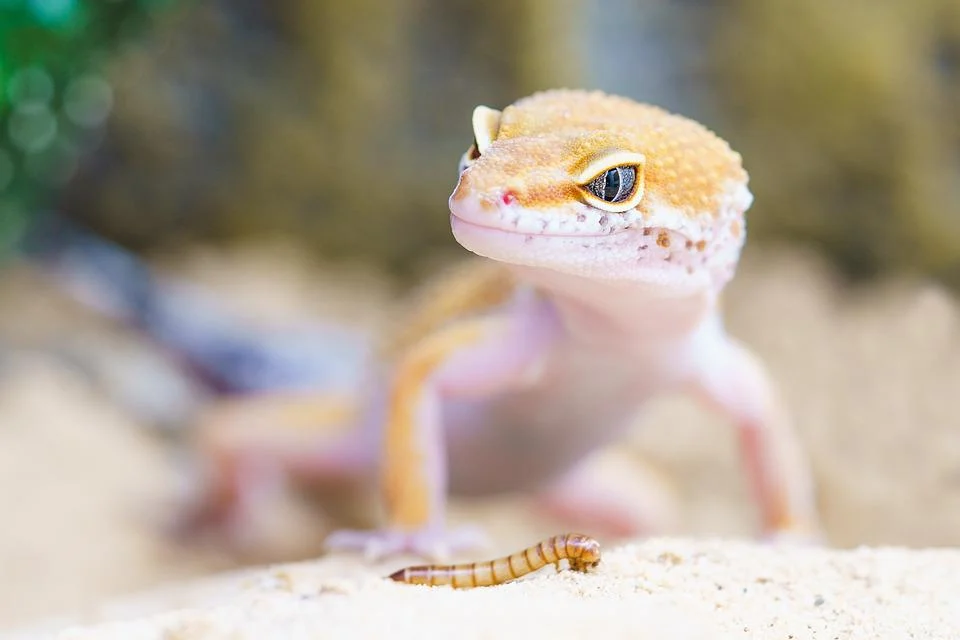A gecko is a small to medium-sized nocturnal reptile that is native to the warmer parts of the world. These gorgeous creatures come in a variety of colors and sizes, with many distinctive morphs characterizing their appearance.
Geckos are generally adorable, easy to look after, and also make amazing pets for beginner reptile enthusiasts. Yet if you want to bring one of these pets into your home, you must understand how to truly take care of one.
If you’re unsure of how to care for a gecko, or simply want to find out more about providing them with the best possible life, this article will be a great starting point!
Provide Food And Water
If you hate bugs, a gecko is not the pet for you!
You may find yourself asking “what do geckos eat?” Well, these cute creatures are pretty straightforward to feed. Most geckos thrive eating banquets of live prey instead of prepared food or kibble. This means you will need to purchase live insects to properly feed your gecko.
Some of the best insects to feed your gecko include:
- Mealworms
- Crickets
- Flies
- Superworms
- Waxworms
However, geckos can also eat fruit to supplement their diet in addition to insects such as apricots, apples, or grapes. You can try incorporating prepared fruit mixes formulated exactly for geckos or pureed fruit mixes to vary their diet a little bit. If you opt to chop some of the fruit, make sure the pieces are smaller than the space between your gecko’s eyes!
Put a shallow water bowl inside of the tank and keep it topped up as it keeps the level of humidity up, which is something a gecko needs to ensure good skin health.
Habitat
Tank Size
Geckos do best in a long and low tank that doesn’t require them to climb. It should be stored out of direct sunlight to maintain an optimum temperature and covered with a mesh lid to prevent your gecko from escaping.
If you have a single gecko, make sure the tank is (at minimum) 10 gallons. A pair should be at 15 gallons while four geckos need to share a 20-gallon tank.
Furniture
There are three main areas in a gecko tank: one for exploring, another for basking in the heat, and one for hiding. Having these different sections keeps the gecko from becoming frustrated or bored with their environment, which is great for you and them.
You should opt to decorate your gecko tank with artificial plants so that your gecko will not eat them. However, if you do opt for live plants, make sure it’s safe in case your gecko does manage to eat it!
Lighting
Notably, the bulb in a gecko tank should be positioned above the mesh lid so it does not stress out the gecko inside. Geckos can register seasons and prefer 14-hour-long summer days and 12-hour winter days. As geckos are nocturnal creatures, you must make sure to distinguish night from day. Use a timer to maintain consistency if you need to!
Heating
Geckos cannot digest food so maintaining an optimum temperature is critical! It should stick around the 70s Fahrenheit at night and between 80 and 85 Fahrenheit during the day.
Cleaning The Tank
Like any creature, cleanliness is essential in keeping your gecko happy and healthy. You should aim to maintain the tank daily, removing soiled bedding and any uneaten food, with a full tank clean around once a week.
Take out everything in the tank including substrate and furniture and then clean everything down. Once everything is clean, it can be placed back into the tank.
Handling Your Gecko
Geckos are delicate and sedate creatures, which means they must be handled gently and with care.
You should always assume that all reptiles (including geckos) carry salmonella, according to the Center for Disease Control. Make sure to wash your hands frequently when handling a gecko to lower the risk of getting an infection.
Maintain Their Health And Well-Being
Staying on top of your gecko’s well-being is absolutely vital otherwise you risk getting them sick. There are multiple things you must look out for in your gecko, including:
- Respiratory disease
- Metabolic bone disease
- Mental stimulation
- Tail shedding
Summary
These are the main considerations you must have when caring for a gecko. As long as you provide the right living environment and the most nutritional diet that caters to their needs, it won’t be too difficult to care for a gecko!

